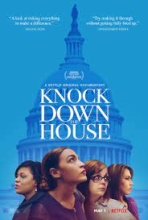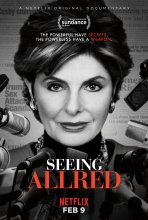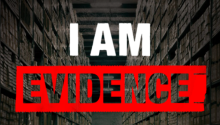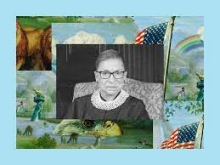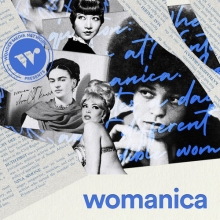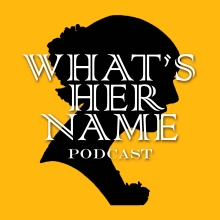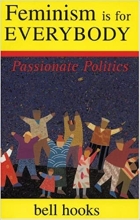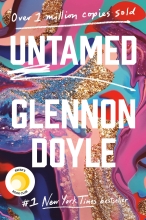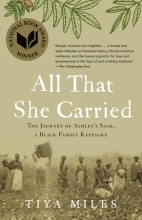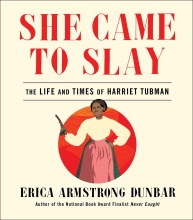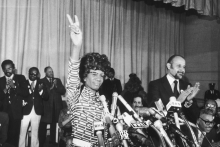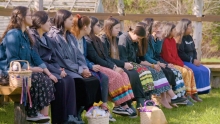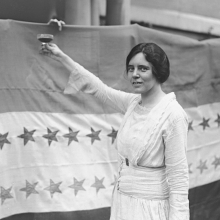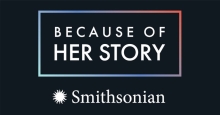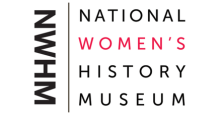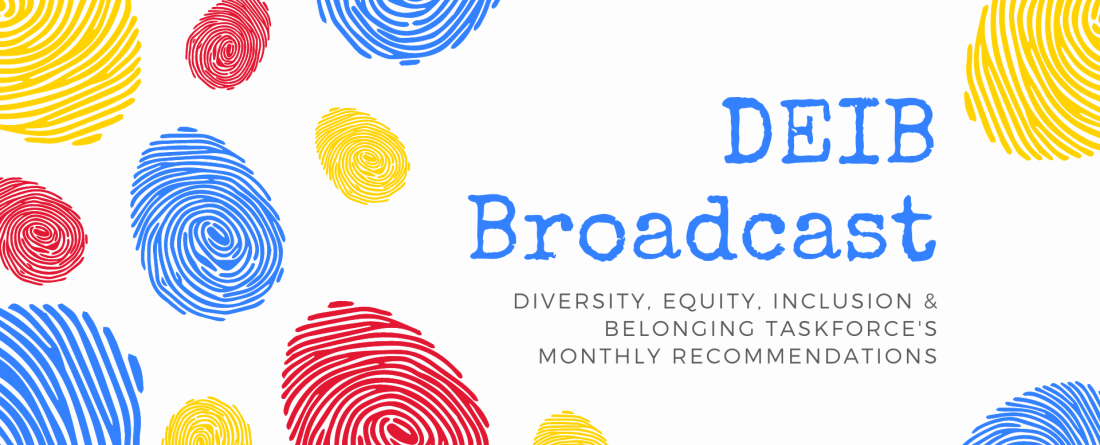
The School of Public Policy is committed to creating a thriving, inclusive environment at the School, where everyone takes an active role in incorporating diversity, inclusion and belonging into their work, classroom and interactions with students and colleagues. To that end, we’re excited to share our monthly recommendations for books, poetry, documentaries, podcasts, art and more for students to refer to on their personal and professional journeys to cultivating diversity, inclusion and belonging.
In the month of March we observe Women’s History Month, which commemorates and encourages the study, observance and celebration of the vital role of women in American history. The 2022 theme is "Women Providing Healing, Promoting Hope." To that end, here are a few recommendations from SPP staff, faculty, and members of the Diversity, Inclusion and Belonging Taskforce for you to engage with this month!
Watch
Knock Down the House (Netflix)
At a moment of historic volatility in American politics, four women decide to fight back, setting themselves on a journey that will change their lives and their country forever. Knock Down the House is a documentary that illustrates how without political experience or corporate money, they build a movement of insurgent candidates challenging powerful incumbents in Congress. Their efforts result in a legendary upset.
Seeing Allred (Netflix)
As sexual-violence allegations grip the nation, Seeing Allred provides a look at one of the most public crusaders against the war on women. Through archival footage and interviews with both her supporters and critics, this biographical portrait examines Gloria Allred's personal trauma and assesses both her wins and setbacks on high-profile cases against Bill Cosby and Donald Trump.
I Am Evidence (HBO)
Recommended by Miranda Baxter, MPP '22
“Sexual violence is an incredibly pervasive problem; though hundreds of thousands of women are sexually assault each year, only a fraction of perpetrators are held accountable. I Am Evidence shines a light on the backlog of sexual assault kits in the U.S. and poses serious questions about the institutions that have turned a blind eye to women—particularly women of color—for decades. The film's survivor-centered lens provides a unique perspective that not only implicates the justice system, but tells a powerful story about women's resilience, courage, and strength in the face of trauma.” - Miranda Baxter
Listen
How RBG Became “Notorious” (The Experiment)
Learn about How RBG Became “Notorious”: In her fight for women’s rights, the then-ACLU lawyer Ruth Bader Ginsburg did something unexpected: She argued on behalf of men. “It didn’t matter to her if the plaintiff was a man or a woman,” says the Georgetown law professor Wendy Williams. “Because in most of those cases, the discrimination against the man was derivative of a prior and worse discrimination against the woman.” Craig v. Boren involved Oklahoma frat boys, a drive-through convenience store, and gender-specific beer laws. The Supreme Court’s landmark 1976 decision was foundational in advancing equal rights for women and represented a key moment in the future justice’s career.
Womanica (Podcast)
Thinking back to our history classes growing up, we had one question: Where the ladies at? Enter, Womanica. In just 5 minutes a day, learn about different incredible women from throughout history. In Wonder Media Network’s daily podcast, we’re telling the stories of women you may or may not know -- but definitely should.
What’sHerName (Podcast)
What’sHerName women’s history podcast is hosted and produced by academic sisters Dr. Katie Nelson and Olivia Meikle. Committed to reclaiming forgotten history, What’sHerName tells the stories of fascinating women you’ve never heard of (but should have). Through compelling interviews with guest historians, writers, and scholars, Olivia and Katie bring to life the “lost” women of history. Fascinating and funny, thought-provoking and thoughtful, What’sHerName restores women’s voices to the conversation.
Read
Feminism is for Everybody: Passionate Politics, by bell hooks
'Simply put, feminism is a movement to end sexism, sexist exploitation, and oppression.' So begins Feminism is for Everybody, a short, accessible introduction to feminist theory by one of its most influential practitioners. Designed to be read by all genders, this book provides both a primer to the question 'what is feminism?' and an argument for the enduring importance of the feminist movement today.
Untamed, by Glennon Doyle
Soulful and uproarious, forceful and tender, Untamed is both an intimate memoir and a galvanizing wake-up call. It is the story of how one woman learned that a responsible mother is not one who slowly dies for her children, but one who shows them how to fully live. It is the story of navigating divorce, forming a new blended family, and discovering that the brokenness or wholeness of a family depends not on its structure but on each member’s ability to bring her full self to the table. And it is the story of how each of us can begin to trust ourselves enough to set boundaries, make peace with our bodies, honor our anger and heartbreak, and unleash our truest, wildest instincts so that we become women who can finally look at ourselves and say: There She Is.
All That She Carried, by Tiya Miles
All That She Carried is a poignant story of resilience and of love passed down through generations of women against steep odds. It honors the creativity and fierce resourcefulness of people who preserved family ties even when official systems refused to do so, and it serves as a visionary illustration of how to reconstruct and recount their stories today.
She Came to Slay: The Life and Times of Harriet Tubman by Erica Armstrong Dunbar
Harriet Tubman is best known as one of the most famous conductors on the Underground Railroad. As a leading abolitionist, her bravery and selflessness has inspired generations in the continuing struggle for civil rights. Now, National Book Award nominee Erica Armstrong Dunbar presents a fresh take on this American icon blending traditional biography, illustrations, photos, and engaging sidebars that illuminate the life of Tubman as never before in She Came to Slay: The Life and Times of Harriet Tubman.
Shirley Chisolm’s “Do Women Dare?” Speech
Recommended by Dr. Alana Hackshaw
Shirley Chisholm became the first African American woman elected to Congress in 1968, and in 1971 decided to run for president. The congresswoman from New York announced her intentions to secure the Democratic nomination in September, and formally announced on Jan. 25, 1972, making her the first African American to contend for the presidential nomination of a major party. In 1969, Chisholm was empaneled at the New School with Gloria Steinem, author, feminist, and activist, and Jacqueline Grenenwexler, the former president of Webster College. The three women, inaugurating the Human Relations Center at the New School, considered the provocation “Do Women Dare?” which led to Chisholm delivering this powerful speech that feels as vital today as it did half a century ago.
Experience
Without a Whisper: Konnon:Kwe - Film Screening and Virtual Discussion (The Smithsonian - Event)
In celebration of Women’s History Month, view Without a Whisper: Konnon:Kwe, a film about the untold history of Native women’s influence on the early women’s rights movement in the United States. The screening will be followed by a virtual panel discussion among Bear Clan Mother Louise Herne (Mohawk), Founder and Executive Director of the Matilda Joslyn Gage Foundation and Center for Social Justice Dialogue, Sally Roesch Wagner, and filmmaker Katsitsionni Fox (Mohawk), moderated by Vision Maker Media’s Director of Programs and Projects Georgiana Lee-Ausan (Navajo).
Women’s History Milestones: A Timeline (The History Channel - Website)
Women’s history is full of trailblazers in the fight for equality in the United States. From Abigail Adams imploring her husband to “remember the ladies” when envisioning a government for the American colonies, to suffragists like Susan B. Anthony and Elizabeth Cady Stanton fighting for women's right to vote, to the rise of feminism and Hillary Clinton becoming the first female nominee for president by a major political party, American women have long fought for equal footing throughout the nation’s history. And while some glass ceilings have been shattered (see: Title IX), others remain. But progress continues to be made. As Clinton said while accepting her nomination, “When there are no ceilings, the sky's the limit.”
Because of Her Story (The Smithsonian - Virtual Exhibit)
Women have contributed to America’s most defining moments - times that shaped constitutional rights, yielded scientific breakthroughs, created the symbols of our nation. Yet a diversity of women’s stories has not been widely told. To create a more equitable America, the Smithsonian is researching, disseminating, and amplifying the histories of American women through its American Women’s History Initiative Because of Her Story in preparation for the future Smithsonian American Women’s History Museum. The Smithsonian wants the role of women in American history to be well-known, accurate, acknowledged, and empowering.
National Women’s History Museum (Museum & Online Resource)
Recommended by Ella Clarke, MPP '21
“While there's not a physical activity to do, the National Women's History Museum has great virtual exhibit tours called Sundays@Home, as well as several other events lined up for Women's History Month that highlight the intersectionality of gender, race, sexual orientation, etc.” - Ella Clarke

